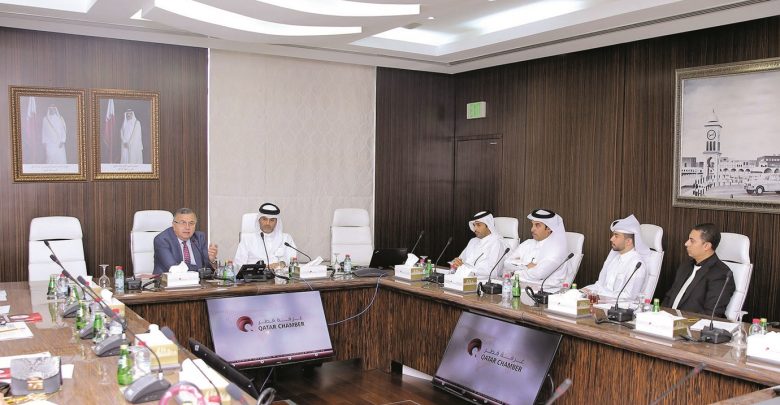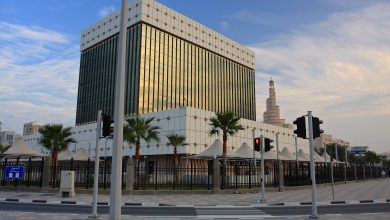
Qicca hosts trainees from Justice ministry
«قطر الدولي للتوفيق والتحكيم» يستضيف متدربين من وزارة العدل
The Qatar International Centre for Conciliation and Arbitration (Qicca) has hosted members of the Centre for Legal and Judicial Studies at the Ministry of Justice for a training session on arbitration and other topics.
The event discussed the most important aspects of commercial arbitration, the role of Qatar Chamber and Qicca in spreading the culture of arbitration in the business community, and alternatives to resolving commercial disputes.
Qicca board member for International Relations Sheikh Dr Thani bin Ali al-Thani said the centre holds regular meetings with trainees, jurists, and those interested in commercial arbitration to introduce arbitration, which is gaining increasing importance globally.
He said the laws and regulations issued in recent years have contributed significantly to Qatar becoming an important economic and trade centre in the region.
Sheikh Thani lauded the issuance of laws and regulations related to the regulation of non-Qatari capital investment, laws regulating economic activity, the commercial register, free zones, industrial zones, the protection of competition, the prevention of monopolistic practices, and electronic commerce, as well as the establishment of a special court for investment and trade.
He also gave a brief introduction about Qicca, which was established in 2006 by a resolution issued by the board of directors of the Qatar Chamber and the adoption of its rules that are consistent with the rules of the Model Unistral (2010).
The centre’s Arbitration Committee also holds seminars and lectures to raise awareness of arbitration and encourage companies to resort to arbitration. Similarly, major conferences are organised with the participation of experts and international jurists to learn about the latest arbitration practices, in addition to training programmes and programmes of rehabilitation and preparation of arbitrators.
Qicca counsellor Dr Minas Khatchadourian also presented a brief about the most important procedures and methods of arbitration in the centre.
استضاف مركز قطر الدولي للتوفيق والتحكيم بغرفة قطر، نهاية الأسبوع الماضي، عدداً من المتدربين من مركز الدراسات القانونية والقضائية بوزارة العدل، لاطلاعهم على أهم الجوانب المتعلقة بالتحكيم التجاري، ودور الغرفة والمركز في نشر ثقافة اللجوء إلى التحكيم داخل مجتمع الأعمال وإعداد الكوادر التحكيمية، وأهمية التحكيم باعتباره وسيلة بديلة لحل المنازعات التجارية.
وقال سعادة الدكتور الشيخ ثاني بن علي بن سعود آل ثاني، عضو مجلس الإدارة للعلاقات الدولية بمركز قطر الدولي للتوفيق والتحكيم: «إن التحكيم يكتسب أهمية متزايدة على الصعيد العالمي، ويُعتبر من الوسائل التي تفضّلها الشركات المحلية عند حدوث نزاع معين، لا سيّما أن هذه النزاعات ترتبط بعقود ذات اطراف متعددة؛ مما يجعل التحكيم وما يتميز به من سرعة وسرية وبساطة الإجراءات والكفاءة الفنية في مقدمة الوسائل البديلة للقضاء».
وأضاف سعادته أن القوانين والتشريعات الصادرة في الأعوام الأخيرة قد ساهمت بشكل كبير في أن تصبح قطر مركزاً اقتصادياً وتجارياً مهماً في المنطقة، مشيداً بصدور القوانين والتشريعات المتعلقة بتنظيم استثمار رأس المال غير القطري والقوانين المنظمة للنشاط الاقتصادي، والسجل التجاري والمناطق الحرة الاستثمارية والمناطق الصناعية وتنظيم أعمال الوكلاء التجاريين، وحماية المنافسة ومنع الممارسات الاحتكارية والتجارة الإلكترونية، بالإضافة إلى إنشاء محكمة خاصة بالاستثمار والتجارة.
وقدّم سعادته اختصاصات المركز، موضحاً أن المركز استقبل 22 طلب تحكيم العام الماضي، قام بإصدار أحكام في 10 قضايا منها بقيمة بلغت نحو 466 مليون ريال.
ومن جهته، قدّم الدكتور ميناس خاشتادوريان، مستشار مركز قطر الدولي للتوفيق والتحكيم، نبذة عن أهم إجراءات ووسائل التحكيم بالمركز، مشيراً إلى أكثر المنازعات شيوعاً وأنها تتعلق بعقود الإنشاءات والمقاولات، وعقود التأمين والاتصالات والعقود الهندسية، والوساطة العقارية، وعقود البيع والتوريد والتمويل.



